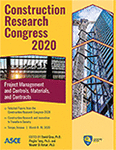Construction Research Congress 2020
Earned Value Management System (EVMS) Reliability: A Review of Existing EVMS Literature
Publication: Construction Research Congress 2020: Project Management and Controls, Materials, and Contracts
ABSTRACT
Supporting project management decisions using an earned value management system (EVMS) brought significant benefits to control schedule and cost for government owners and contractors. However, the lack of a holistic approach in developing and applying an EVMS that is strongly tied to established guidelines tends to cause confusion. This study analyzes existing EVMS studies and suggests management considerations for successful EVMS implementation. Based on a review of literature, this paper identifies a need for improving the reliability of EVMS. Technical guidelines assist in the application of EVM good practices, which can lead to a reliable EVMS. Moreover, the literature review emphasizes that a parallel assessment considering non-technical elements such as the organizations’ management culture, is essential to improve reliability.
Get full access to this article
View all available purchase options and get full access to this chapter.
ACKNOWLEDGEMENT
This study was funded by the U.S. Department of Energy. The authors would like to thank the research team members of this study entitled: “Improving the Reliability of EVMS Compliance Reviews and EVMS Maturity Level Assessments.”
REFERENCES
AACE International. (2005). Cost estimate classification system – as applied in engineering, procurement, and construction for the process industries.
Abdel Azeem, S. A., Hosny, H. E., and Ibrahim, A. H. (2014). “Forecasting project schedule performance using probabilistic and deterministic models.” HBRC Journal, Housing and Building National Research Center, 10(1), 35–42.
Acebes, F., Pajares, J., Galán, J. M., and López-Paredes, A. (2013). “Beyond earned value management: A graphical framework for integrated cost, schedule and risk monitoring.” Procedia - Social and Behavioral Sciences, Elsevier B.V., 74, 181–189.
Anbari, F. T. (2003). “Earned value project management method and extensions.” Project Management Journal, 34(4), 12–23.
Batselier, J., and Vanhoucke, M. (2015). “Evaluation of deterministic state-of-the-art forecasting approaches for project duration based on earned value management.” International Journal of Project Management, Elsevier Ltd. APM and IPMA., 33(7), 1588–1596.
Bryde, D., Unterhitzenberger, C., and Joby, R. (2018). “Conditions of success for earned value analysis in projects.” International Journal of Project Management, Elsevier Ltd, APM and IPMA, 36(3), 474–484.
Chen, H. L., Chen, W. T., and Lin, Y. L. (2016). “Earned value project management: Improving the predictive power of planned value.” International Journal of Project Management, Elsevier Ltd and Association for Project Management and the International Project Management Association, 34(1), 22–29.
Christensen, D. S. (1994). “A review of cost/schedule control systems criteria literature.” Project Management Journal, 25(3), 32–39.
Construction Industry Institute. CII. (2019). PDRI: Project definition rating index -- Industrial projects, version 5.0. IR113-2
Colin, J., and Vanhoucke, M. (2014). “Setting tolerance limits for statistical project control using earned value management.” Omega, Elsevier, 49, 107–122.
Czemplik, A. (2014). “Application of earned value method to progress control of construction projects.” Procedia Engineering, Elsevier B.V., 91(TFoCE), 424–428.
Department of Defense. (2017). Department of defense instruction 5000.02: Operation of the defense acquisition system.
de Wit, A. (1988). “Measurement of project success.” International Journal of Project Management, 6(3), 164–170.
Dodson, M., Defavari, G., and de Carvalho, V. (2015). “Quality: The third element of earned value management.” Procedia Computer Science, Elsevier Masson SAS, 64, 932–939.
DOE. (2019). DOE EVMS gold card.
El Asmar, M., Gibson, G. E., Jr, Ramsey, D., Yussef, A., Ud Din, Z. (2018). “The maturity and accuracy of front end engineering design (FEED) and its impact on project performance.” CII RR331-11.
Elshaer, R. (2013). “Impact of sensitivity information on the prediction of project’s duration using earned schedule method.” International Journal of Project Management, Elsevier Ltd and IPMA, 31(4), 579–588.
Gibson, G. E., Kaczmarowski, J. H., and Lore, H. E. (1995). “Preproject-planning process for capital facilities.” Journal of Construction Engineering and Management, 121(3), 312–318.
Hunter, H., Fitzgerald, R., and Barlow, D. (2014). “Improved cost monitoring and control through the earned value management system.” Acta Astronautica, Elsevier, 93, 497–500.
International Standard Organization. ISO. (2018). Earned value management in project and programme management.
Kim, E., Wells, W. G., and Duffey, M. R. (2003). “A model for effective implementation of Earned Value Management methodology.” International Journal of Project Management, 21(5), 375–382.
Naderpour, A., and Mofid, M. (2011). “Improving construction management of an educational center by applying earned value technique.” Procedia Engineering, Elsevier B.V., 14, 1945–1952.
Narbaev, T., and De Marco, A. (2014). “An earned schedule-based regression model to improve cost estimate at completion.” International Journal of Project Management, Elsevier Ltd and IPMA, 32(6), 1007–1018.
National Aeronautics and Space Administration. NASA. (2018). Earned value management (EVM) implementation handbook.
National Defense Industrial Association. NDIA. (2011). Earned value management systems EIA-748-D intent guide.
Staley, M. J., Oberndorf, P., and Sledge, C. A. (2002). Using EVMS with COTS-based systems.
Vandevoorde, S., and Vanhoucke, M. (2006). “A comparison of different project duration forecasting methods using earned value metrics.” International Journal of Project Management, 24(4), 289–302.
Warburton, R. D. H. (2011). “A time-dependent earned value model for software projects.” International Journal of Project Management, Elsevier Ltd and IPMA, 29(8), 1082–1090.
Willems, L. L., and Vanhoucke, M. (2015). “Classification of articles and journals on project control and earned value management.” International Journal of Project Management, Elsevier Ltd. APM and IPMA., 33(7), 1610–1634.
Yussef, A., Gibson, G. E. jr, El Asmar, M., Ramsey, D. (2019). “Quantifying FEED maturity and its impact on project performance in large industrial projects.” Journal of Management in Engineering. 35(5), 04019021.
Information & Authors
Information
Published In
Construction Research Congress 2020: Project Management and Controls, Materials, and Contracts
Pages: 631 - 639
Editors: David Grau, Ph.D., Arizona State University, Pingbo Tang, Ph.D., Arizona State University, and Mounir El Asmar, Ph.D., Arizona State University
ISBN (Online): 978-0-7844-8288-9
Copyright
© 2020 American Society of Civil Engineers.
History
Published online: Nov 9, 2020
Authors
Metrics & Citations
Metrics
Citations
Download citation
If you have the appropriate software installed, you can download article citation data to the citation manager of your choice. Simply select your manager software from the list below and click Download.
